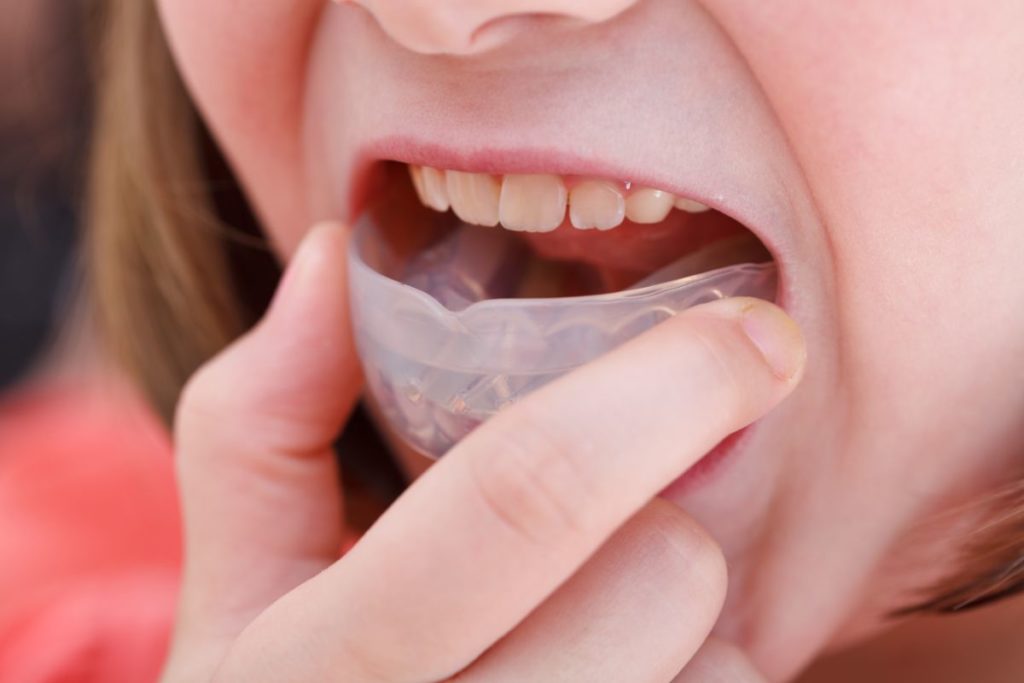You’re probably not thinking about wearing a mouthguard when you’re heading to the gym or hopping on a bike. Everyone who has knocked out a tooth wishes they could have known what it’s like to have an artificial tooth, and how easy it would have been to prevent a simple exercise-related accident. Not only is restorative dental work expensive, but it can also make something as simple as eating more difficult. Keeping your full set of natural teeth is always the best option, and that’s why it’s so important to protect your teeth with a mouthguard during exercise. It’s the best way to protect (and keep!) your teeth while at the gym, riding your bike, or participating in any kind of exercise or sport.
A mouthguard may be the last workout accessory you think to put in your gym bag, but workout injures real, even if your exercise of sport doesn’t seem to involve a lot of risk for your mouth. Whether you’re running, cycling, weight training, or CrossFit, a workout-related accident is always possible. Keep reading to learn more about protecting your teeth while keeping your body healthy.
How A Mouthguard Protects Your Teeth During Exercise
The mouthguard’s job is to absorb the force of any impact that your mouth encounters. If you fall, your teeth can hit each other and crack, and there’s always the possibility of accidentally getting hit in the face while working out or playing a sport. By absorbing these impacts and keeping your teeth from coming into contact with each other, mouthguards keep your teeth from chipping, breaking, or getting knocked.
Mouthguards are usually made from a strong but flexible material, and protect your teeth, gums, and jaw by covering your upper teeth. According to the American Dental Association, an effective mouthguard will redistribute the force of an impact from an object or person, so the energy dissipates without causing significant damage. You may still be sore or end up with a bruise, but at least you’ll have all of your teeth!
Why Wear A Mouthguard During Exercise
Whenever you participate in high-impact, low-impact, and even no impact sports or forms of exercise, you risk a variety of dental injuries, such as:
- Lip and cheek lacerations
- Chipped or broken teeth
- Tooth root damage
- Fractured jaws
- Damaged restoration
- Concussion
Wearing a mouthguard during exercise can reduce your risk of injury by up to sixty times. Mouthguards may only be mandatory in organized contact sports such as football, boxing, hockey, and other sports with an inherently higher risk. But, athletes of any kind can benefit from the protection offered by a mouthguard. Players on any kind of sports team can make contact with one another, whereas any individual sport can cause injury if you fall. Flying balls, rackets, and other hard equipment can also produce serious dental injuries.
Your teeth can be easily knocked out during other equipment-free exercises as well, especially if you’re into boxing, kickboxing, and mixed martial-based workouts. Wearing a mouthguard can protect your teeth from accidental knocks from your sparring partner and protect your teeth from injuries or getting knocked out.
Here are a few other factors to keep in mind:
- Your dental insurance likely won’t cover any dental injuries because most dental plans have a maximum yearly benefit that is less than the typical fee to treat an injury. Knocking out a tooth can cost thousands of dollars that your dental insurance is unlikely to cover. Wearing a mouthguard is more than worth the investment when you consider this.
- Broken teeth are permanent. Once you break your adult teeth, they don’t grow back. Dental bonding and other treatments might help you replace your lost tooth, but it won’t be cheap.

Choosing the Right Mouthguard
A mouthguard is an essential piece of sports equipment. Exercise is an essential part of a healthy lifestyle, but many physical activities carry a risk of injury to the mouth, jaw, or teeth. An over-the-counter or custom-made mouthguard protects in these situations.
Moldable or Preformed?
A moldable mouthguard provides a high level of protection by fitting snugly but comfortably against the teeth. Preformed mouthguards are similar in how they are developed, and although these mouthguards are less expensive, they often don’t fit as well and can become difficult to hold in the mouth without falling out. As you might assume, moldable mouthguards are molded to the shape of the wearers’ teeth. They’re less likely to move around or slip as a result, which means they absorb impacts well.
Custom Made by Dentist or Make it at Home?
A dentist can order a custom-made moldable mouthguard that fits your mouth perfectly, or you can buy a mouthguard kit and mold your own at home. At the dentist’s office, the dentist takes an impression of your teeth using a special mold. He or she then uses this mold to order a mouthguard that fits your mouth exactly and sits comfortably over your teeth. This custom-made moldable mouth guard may be a more expensive option, but it offers the best protection.
Alternatively, you can make a mouth guard using a “boil and bite” kit. Here, you boil a preformed mouthguard in water, then put it in your mouth and bite down. If you follow the directions correctly, a “boil and bite” mouthguard provides a good fit.
Playing sports should be fun; you shouldn’t have to worry about disfigurement or otherwise expensive oral injuries. Wearing a mouth guard that’s molded to the shape of your mouth and teeth provides peace of mind while offering the protection you or your child needs. Make a mouthguard part of your essential sports equipment.
Nothing Beats Your Real Teeth
Dental science and technology have improved by leaps and bounds over the years, and the team at Cashmere Family Dentistry can offer restorative dental treatments that look, feel, and function just like your real teeth. However, these can be expensive and require a little extra care. Protecting your teeth with a mouthguard during exercise is always better than a cure after something has gone wrong.
Contact Cashmere Family Dentistry to talk about any dental problems or questions you may have.




